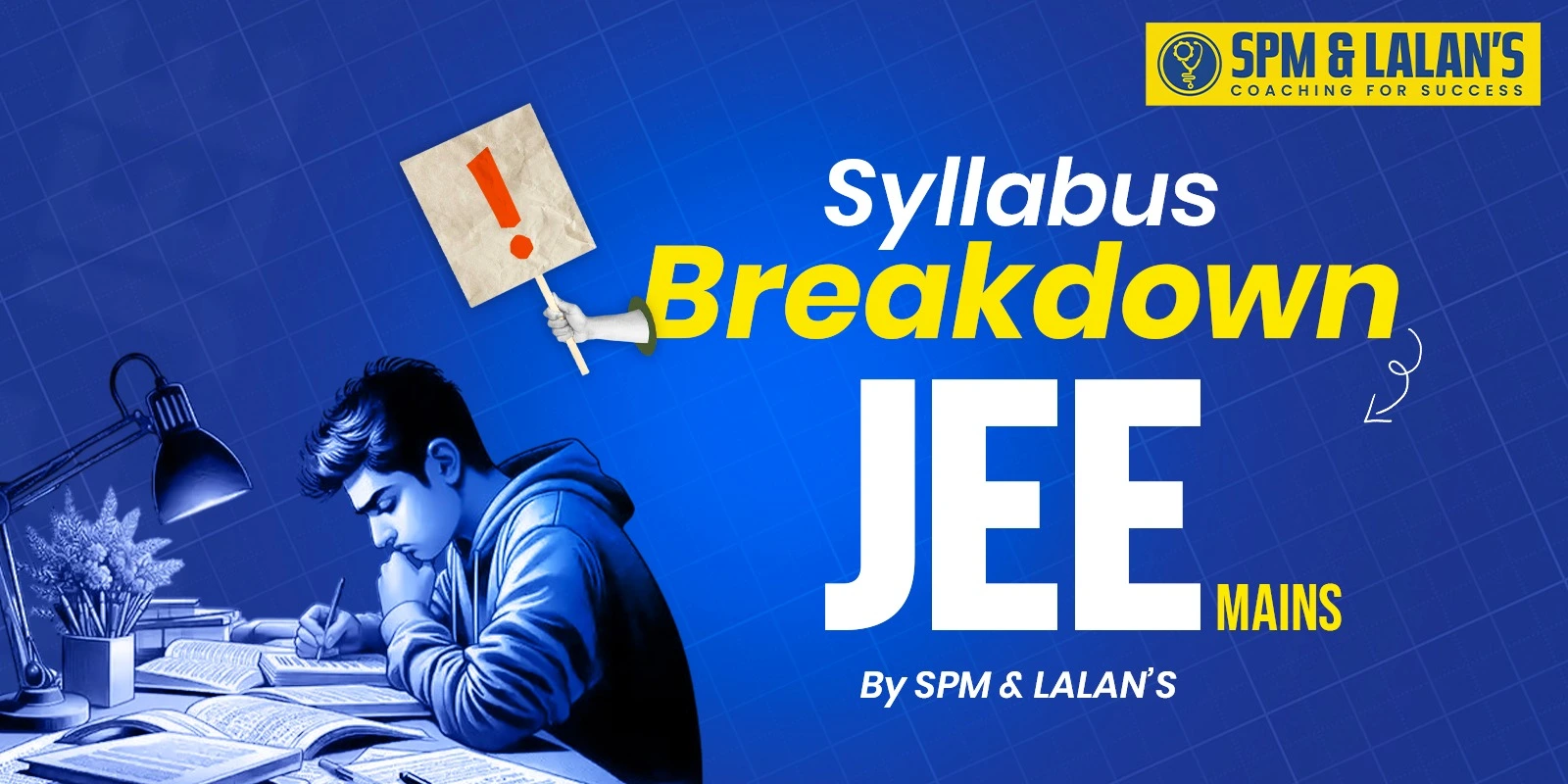Preparing for the Joint Entrance Examination (JEE) is one of the most demanding academic challenges for students in India. Achieving success in JEE Mains and JEE Advanced requires a strategic approach, consistent effort, and a strong understanding of the examination process. Many aspirants focus exclusively on studying, often overlooking common mistakes that can prevent them from reaching their full potential. At SPM and Lalans, we believe that identifying and avoiding these mistakes is just as critical as hard work. This guide explains the most frequent errors students make during their JEE preparation and offers actionable strategies to avoid them.
Starting Without Understanding the Syllabus and Pattern
One of the most common mistakes students make is beginning their preparation without fully understanding the JEE main syllabus and exam pattern. Without this knowledge, it becomes difficult to prioritize topics or plan an effective study plan for JEE.
A thorough understanding of the syllabus allows students to identify high-weightage chapters in Physics, Chemistry, and Mathematics and recognize recurring question patterns. For instance, topics such as mechanics and electromagnetism in IIT JEE Physics, organic reactions in JEE Chemistry, and calculus in JEE Maths often carry significant marks. Students should familiarize themselves with both JEE Mains and JEE Advanced exam patterns, including the type of questions asked, marking schemes, and time management requirements. At SPM and Lalans, we assist students in creating a structured preparation roadmap that aligns with the exam pattern and syllabus, ensuring maximum efficiency.
Using Too Many or the Wrong Study Resources
A common mistake in JEE preparation is relying on multiple books or low-quality study material, which can create confusion and hinder conceptual clarity. Many aspirants think using more resources will cover all topics, but in reality, it often leads to surface-level understanding and wasted time.
Students should start with NCERT textbooks, which form the foundation for most JEE Mains questions. For advanced practice and deeper understanding, selective reference books such as HC Verma for Physics, OP Tandon for Chemistry, and Cengage Mathematics are highly recommended. Avoid switching between too many resources; mastering fewer quality materials is far more effective than superficially covering multiple books. SPM and Lalans emphasizes curating a limited set of high-quality resources to ensure strong conceptual clarity and confidence in solving complex problems.
Ignoring Previous Year Papers
Another mistake many students make is neglecting previous year JEE main question papers. Often, aspirants postpone solving past papers until the last few months, missing out on valuable insights.
Regular practice with previous years’ questions allows students to identify frequently tested topics, recurring patterns, and the difficulty level of questions. Solving and analyzing past papers also helps in time management and builds confidence. Students should aim to integrate previous year papers into their routine practice and use them to identify their strengths and weaknesses. At SPM and Lalans, we guide students to effectively use past papers as a tool for both practice and exam strategy.
Lack of a Structured Study Plan
Studying without a clear study plan for JEE is a mistake that often leads to scattered efforts and inconsistent results. Random study can create gaps in knowledge and make it difficult to cover the entire syllabus in time.
Students should create a personalized and realistic study timetable, dividing their time across Physics, Chemistry, and Mathematics. The plan should include daily, weekly, and monthly targets, along with scheduled time for mock tests, revisions, and breaks. A structured plan ensures steady progress and allows students to balance concept-building with practice. SPM and Lalans provides customized study plans for aspirants, focusing on strengths, weaknesses, and exam priorities.
Avoiding Mock Tests Until It’s Too Late
Many aspirants delay taking JEE main mock tests due to fear of low scores. This is a significant mistake because mock tests are essential for understanding one’s preparedness and building exam temperament.
Mock tests help students simulate the real exam environment, assess time management skills, and identify weak areas. They should start taking mocks early in their preparation, analyze performance after each test, and adjust their strategy accordingly. Treating mock tests as a learning tool rather than just an evaluation method enhances both confidence and performance. At SPM and Lalans, we encourage students to take regular mock tests to refine their JEE mains strategy and JEE Advanced tips.
Poor Time Management During Preparation
Ineffective time management is a frequent obstacle in JEE preparation. Students often spend too much time on certain topics or try to cram entire chapters at the last minute, reducing overall efficiency.
Effective time management involves setting clear daily, weekly, and monthly goals. Techniques such as time-blocking, the Pomodoro method, or prioritizing difficult topics can help optimize study hours. Learning to move on from a question that seems unsolvable during practice prevents loss of time and maintains focus. At SPM and Lalans, we train students in effective time allocation and strategies to enhance productivity during both preparation and exams.
Relying Only on Coaching and Ignoring Self-Study
While JEE coaching provides guidance and structured learning, relying solely on coaching without self-study is a mistake. True mastery of concepts comes from consistent individual effort.
Students should complement coaching lessons with daily self-study, revising concepts, practicing problems, and making personal notes. Self-study reinforces classroom learning and encourages independent problem-solving skills. At SPM and Lalans, our coaching programs are designed to supplement self-study and encourage students to develop their unique JEE preparation strategies.
Weak Conceptual Clarity and Rote Learning
Memorizing formulas and shortcuts without understanding underlying concepts is a major pitfall in cracking JEE Mains. Students often attempt to memorize solutions instead of learning the principles behind them.
Building strong conceptual clarity is essential, especially in IIT JEE Physics and JEE Maths. Understanding why a formula works or a reaction occurs improves problem-solving speed and accuracy. Students should practice multiple methods for solving a single problem to enhance versatility. At SPM and Lalans, our teaching approach emphasizes conceptual understanding over rote memorization, helping students apply concepts in varied situations.
Skipping Revision or Leaving It Too Late
Neglecting revision is another mistake that can significantly impact JEE mains score. Many students focus exclusively on learning new topics and postpone reviewing older chapters, leading to forgotten concepts.
A weekly revision cycle for previously studied topics is crucial. Students should use flashcards, short notes, and error journals to track mistakes and avoid repeating them. Effective revision consolidates memory and strengthens exam confidence. At SPM and Lalans, we provide structured revision schedules integrated with mock tests to reinforce learning and improve retention.
Neglecting High-Yield Topics
Some students ignore fundamental topics, thinking they are easy or less significant. High-yield areas such as Limits, Continuity, Quadratic Equations, and Reaction Mechanisms carry marks and appear frequently in exams.
Mastering these topics through regular practice and problem-solving ensures consistent performance in JEE Mains and JEE Advanced. At SPM and Lalans, we guide students to prioritize high-yield topics while balancing their overall syllabus.
Underestimating the Power of Early Preparation
Starting preparation late reduces the margin for mastery and practice. Early preparation allows students to build concepts gradually and practice extensively.
Ideally, aspirants should start in Class 11, using the first year to strengthen fundamentals and the second year for advanced practice and mocks. Late starters can still perform well by following targeted crash courses and strategic study plans. SPM and Lalans provides accelerated preparation programs for students starting late, ensuring efficient coverage of all topics.
Not Learning How to Guess Intelligently
Many students either guess randomly or avoid uncertain questions entirely. Intelligent guessing can help improve scores, especially in JEE Advanced, where negative marking is a factor.
Students should practice elimination techniques, understand probability, and take calculated risks only when confident. Developing this skill requires regular mock tests and question analysis. At SPM and Lalans, we train students in strategic guessing techniques to optimize their JEE mains score.
Ignoring Mental and Physical Well-Being
Burnout from long study hours, stress, and irregular sleep can significantly affect performance. Mental and physical well-being is critical to sustained preparation.
Students should schedule adequate breaks, maintain a balanced diet, and engage in light exercise or meditation to reduce stress. Consistent rest improves focus, memory, and problem-solving abilities. At SPM and Lalans, we emphasize holistic preparation, combining academic guidance with well-being strategies to ensure optimal performance.
Conclusion
Avoiding these common mistakes can dramatically improve performance and confidence. Success in JEE Mains and JEE Advanced depends not just on hard work, but on smart strategies, consistent practice, and holistic preparation. A well-structured study plan for JEE, combined with effective time management in JEE preparation, regular revisions, and mock tests, forms the foundation of high achievement. At SPM and Lalans, we guide students in creating comprehensive preparation strategies tailored to their strengths and weaknesses, helping them achieve excellence in the Joint Entrance Examination.



